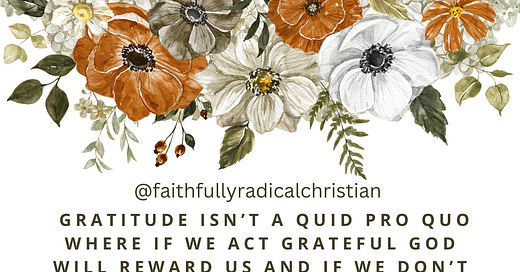It’s Thanksgiving. A day that is uncomfortable for many people for numerous reasons: for some, it involves being with family members who aren’t necessarily safe, for others it may be an extremely lonely day. Not to mention the holiday has been used to further a narrative of colonialism and downplaying the genocide of Indigenous populations that colonialism brought forth. Another reason why this day is uncomfortable is the horrible theology that is often propagated. Listen, there’s nothing wrong with wanting to express thanks to God on this day or any day. But the way gratitude has 1) been weaponized to silence those who are struggling, especially under structural injustice or abuse 2) been used to spread the prosperity gospel, is problematic.
First, no one should be pressured to express gratitude when they are experiencing difficulties. Sure, if one decides that it is helpful for them to not focus on their struggles but instead focus on their blessings, that’s fine. The point is, the individual gets to make that decision and they should not be guilt-tripped into expressing gratitude when they are suffering or mourning. The reality is that lamentation and gratitude can and often does co-exist. However, it is up to the individual who is experiencing hardship to decide what to focus on and when.
Someone, who has a loved one die may choose to focus on the good times they had, and how grateful they are that their loved one was in their lives, but they may also decide to grieve or be angry over their loss. Someone who is struggling to put food on the table may decide to be grateful that they could go to a food pantry or go to a Thanksgiving dinner hosted by a local church or nonprofit or they might be filled with anxiety about the next few days, or angry that no matter how much they work, they can never seem to catch up to all their bills. Either response is understandable.
But too often Christians want to ignore the hardships and downplay them, in favor of solely focusing on their “blessings.” Again, if one chooses to do so, out of a sense of gratitude, that’s great. However, most of the time this desire can be traced to a fear of disappointing or angering God or a sense of deep-seated shame that one isn’t behaving like a “good” Christian. But gratitude isn’t a quid pro quo where if we act grateful God will reward us and if we don’t express gratitude we will be punished. Instead, gratitude should be freely given. And when it is not possible to do so, because life is hard, then there should be no guilt or sense of shame. God isn’t so fragile that they rely on the praises of humanity to survive. God can handle our anger, our grief, our frustration.
Additionally, some Christians have distorted the concept of gratitude and have essentially used it to reinforce the prosperity gospel. They not only thank God for their blessings, but they often frame it in such a way as to imply that they deserve all the good things that they have received and that those who haven’t been blessed as much as they are, must be doing something wrong. They fail to recognize how some of their successes have less to do with hard work or God’s grace and more to do with the fact that they benefit from the exploitation/struggles of other people.
They also encourage others to buy into the prosperity gospel: “if they only pray, go to a specific church, tithe this amount, etc) then God will bless them too. In their worldview, systemic poverty doesn’t exist. Poverty is the result of people who are either extremely lazy or who haven’t given God a reason to bless them. Such a belief is a distortion of the gospel. While yes, one can find Bible verses and stories that support the prosperity gospel (especially in proverbs), there are also many more verses that challenge the idea of wealth being a sign of God’s favor.
So how should we express gratitude? First, gratitude should be expressed freely and voluntarily. Not coerced or the result of guilt and shame. Secondly, one can be grateful for one’s life while also recognizing systems of injustice that keep other people down. One can be grateful, for instance, for the opportunity to get an education, and still recognize that this is not a privilege available to everyone. One doesn’t need to feel bad about accessing education unless they did so through unscrupulous methods or if their whole basis of wealth is built on the exploitation of others, but one can also recognize the reality that some people, through no fault of their own, cannot access education.
And most importantly, if one is suffering, and doesn’t feel like expressing gratitude that’s ok. Or if one finds that one's gratitude is mixed with sadness and anger, that’s okay. Gratitude, yes can be something we seek to foster and implement more in our life, but it need not be compulsory. And there needs to be a recognition that sometimes life sucks and it’s ok to name that.
Image: white background with orange, white, and green flowers. Text: Gratitude isn’t a quid pro quo where if we act grateful God will reward us and if we don’t express gratitude we will be punished.



